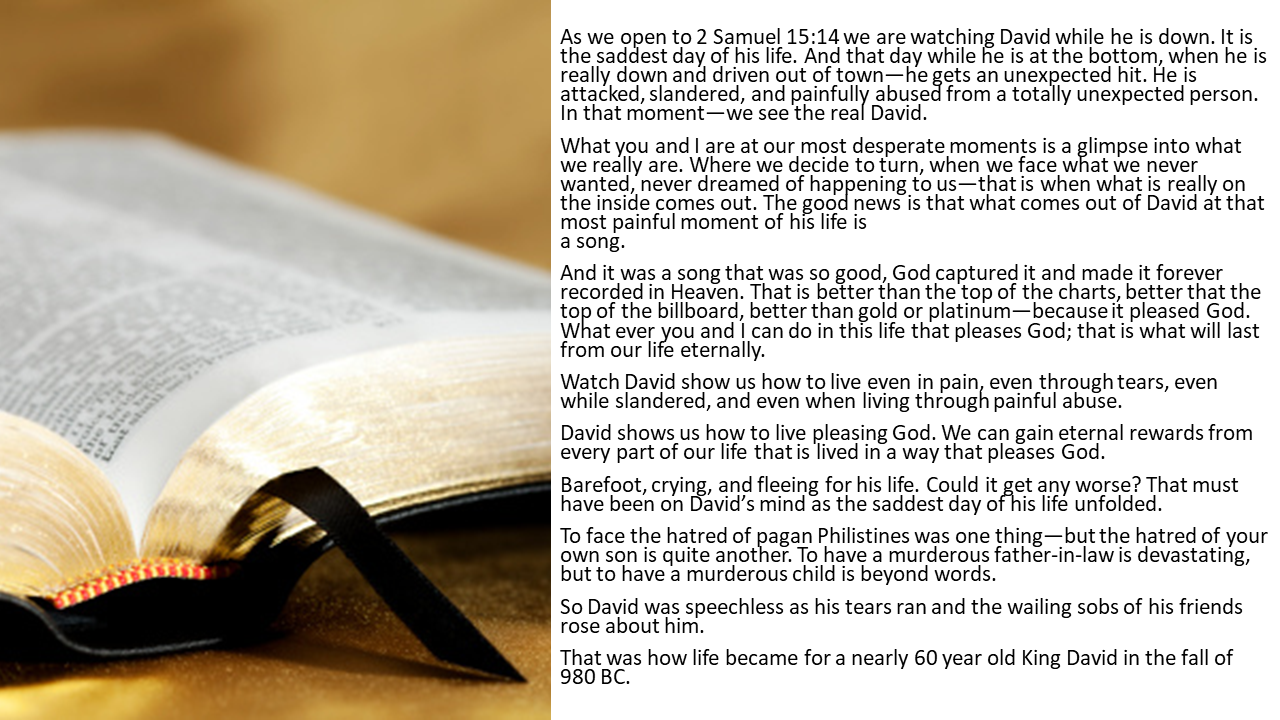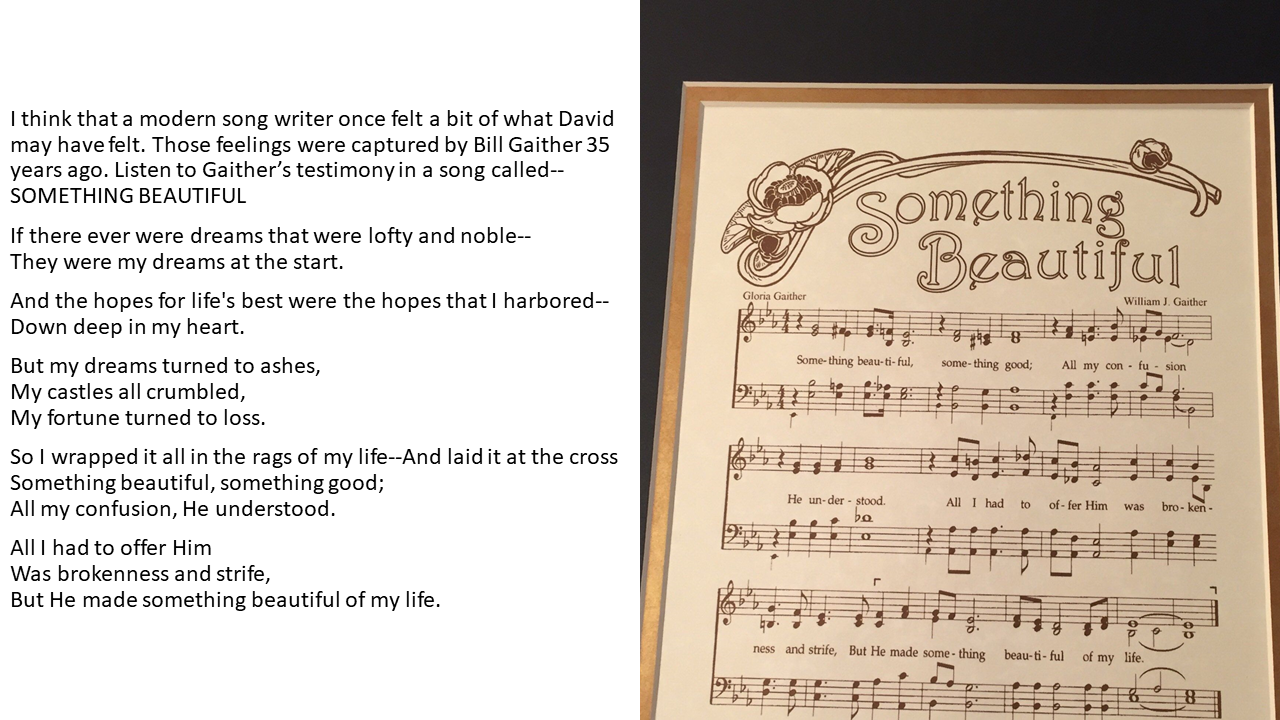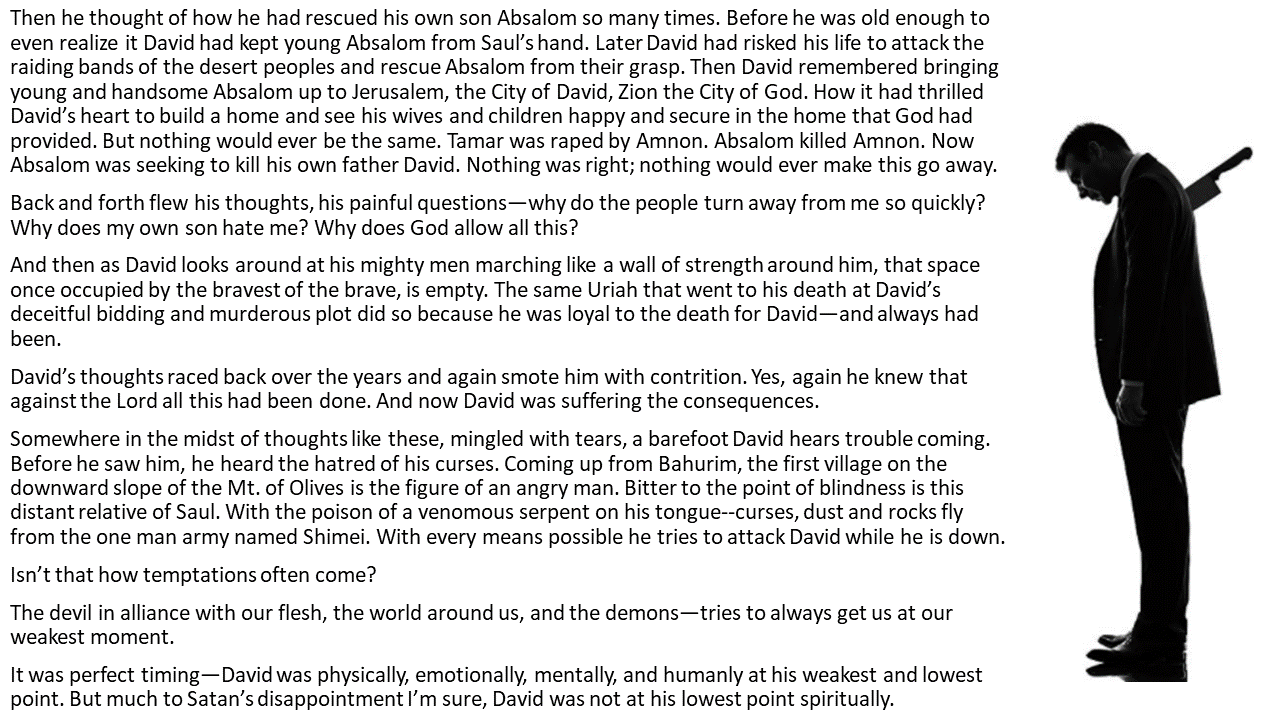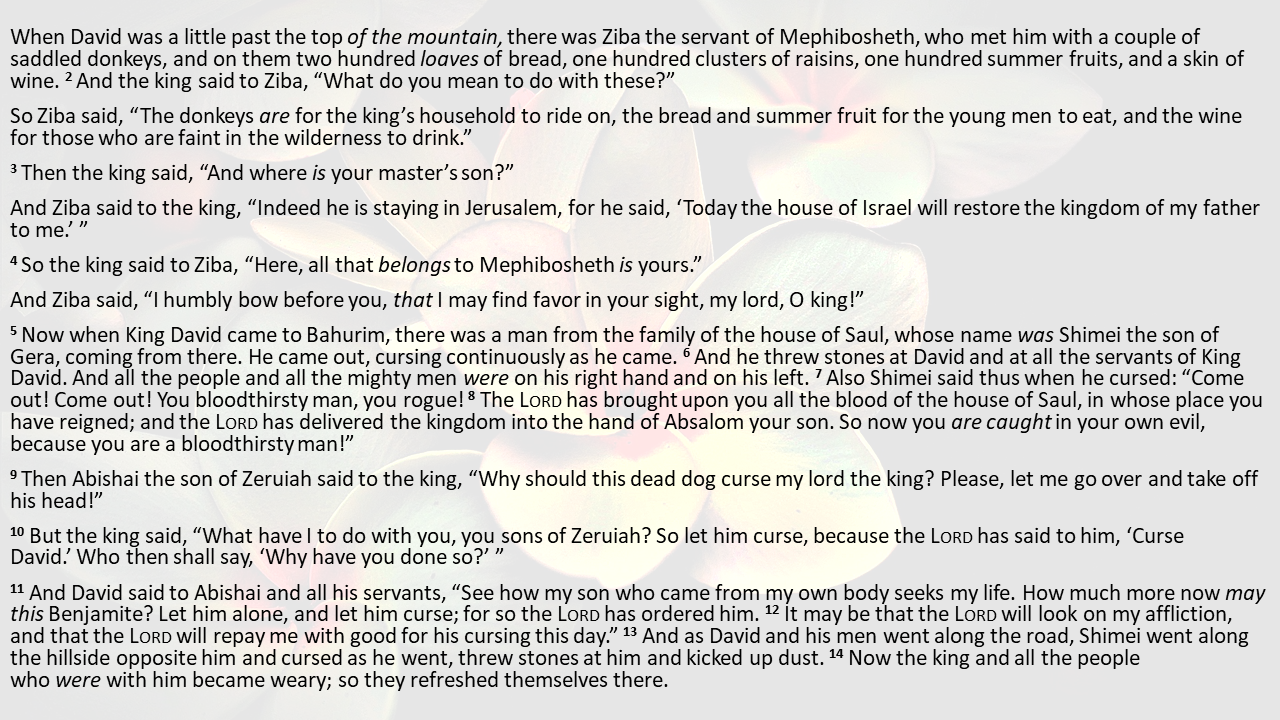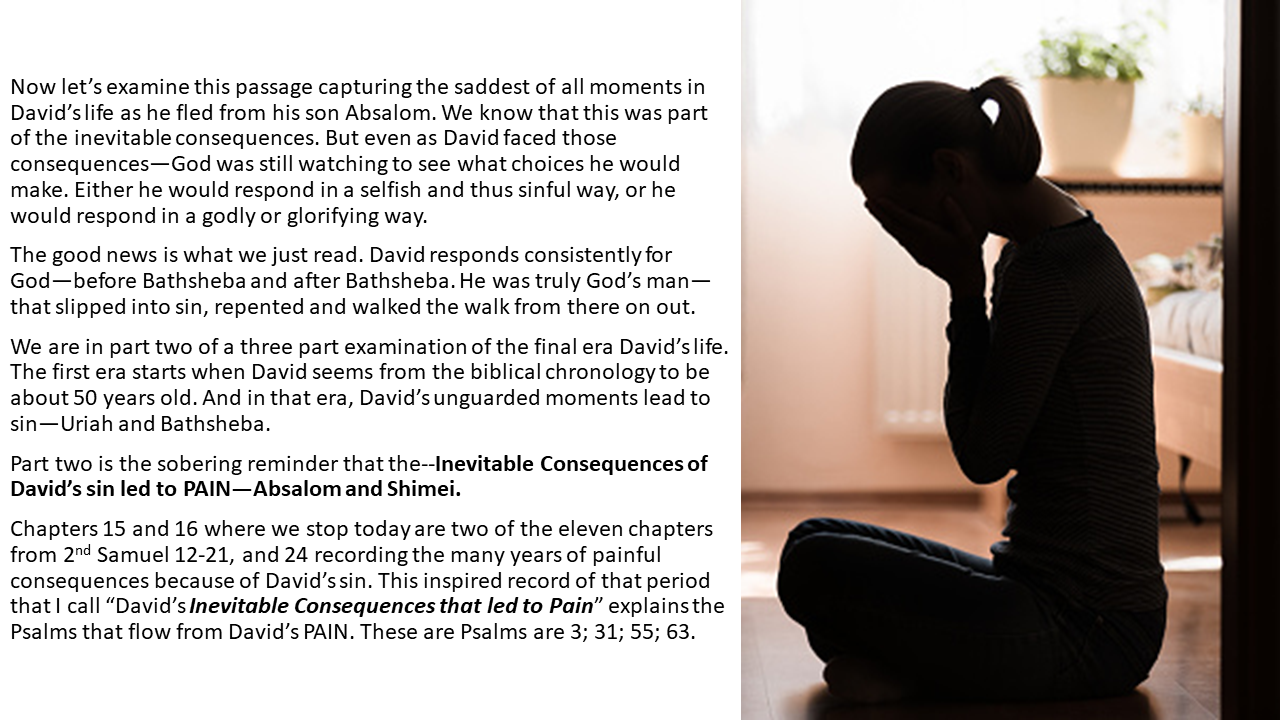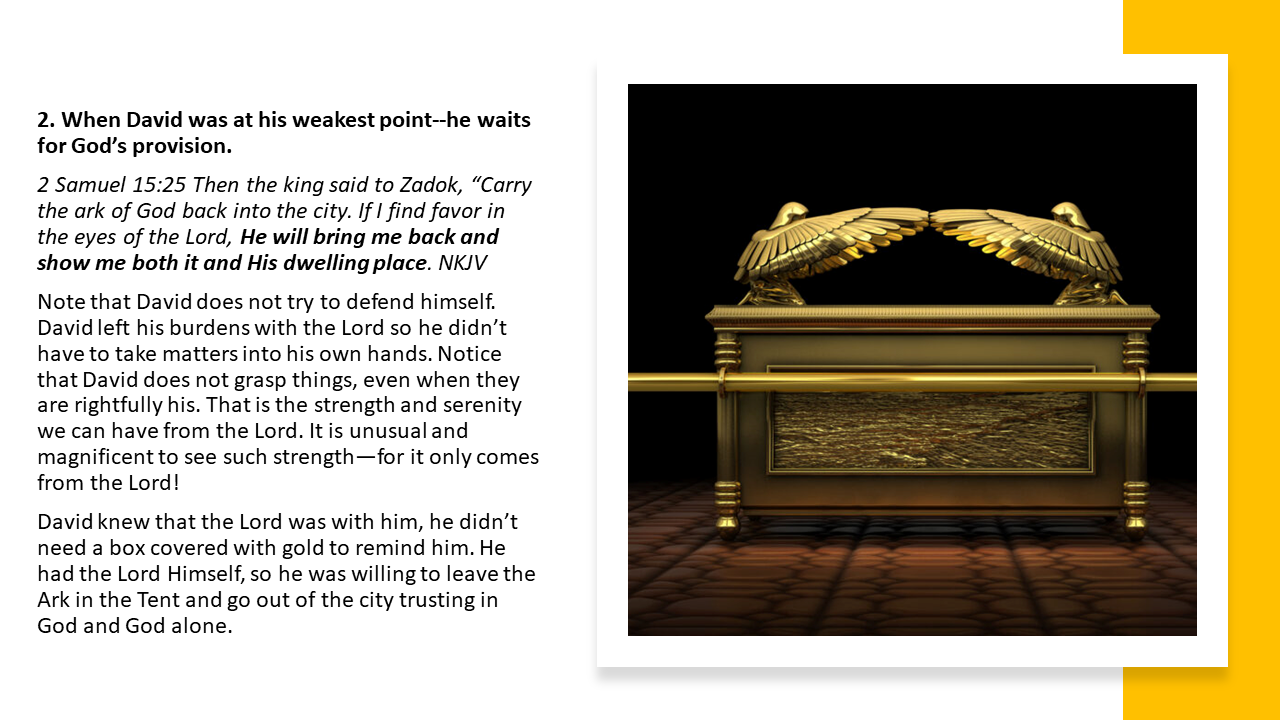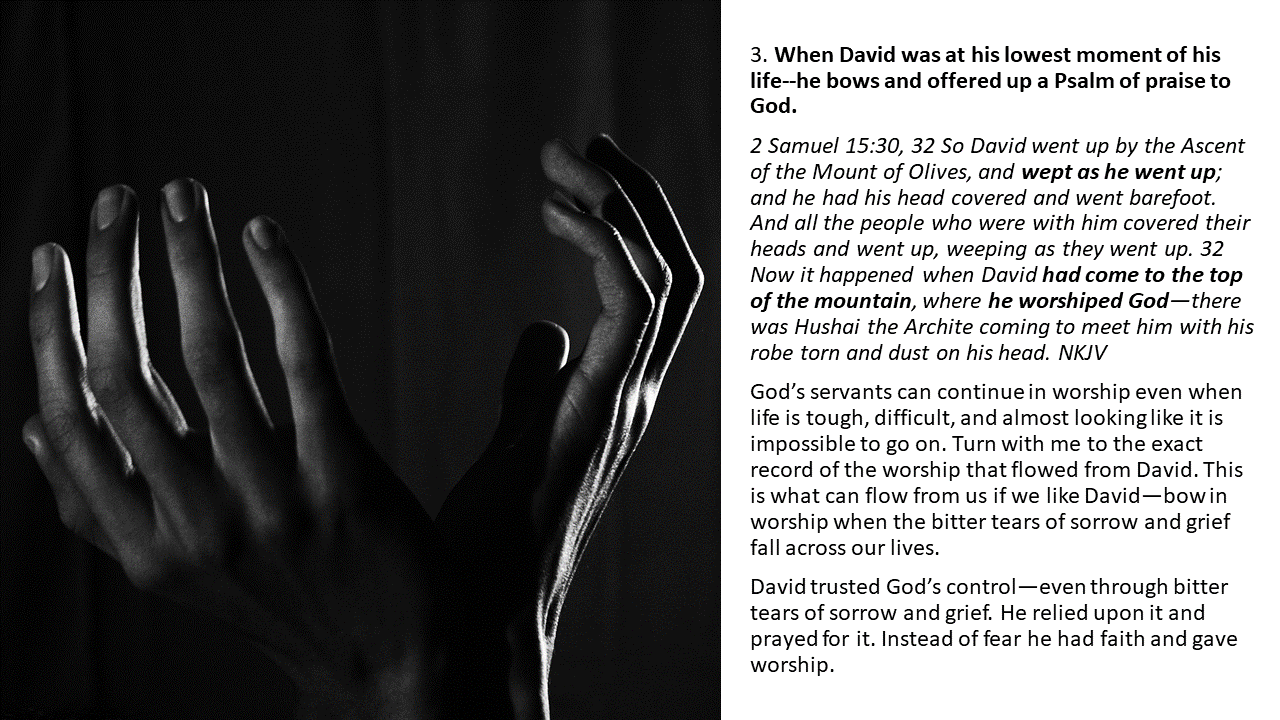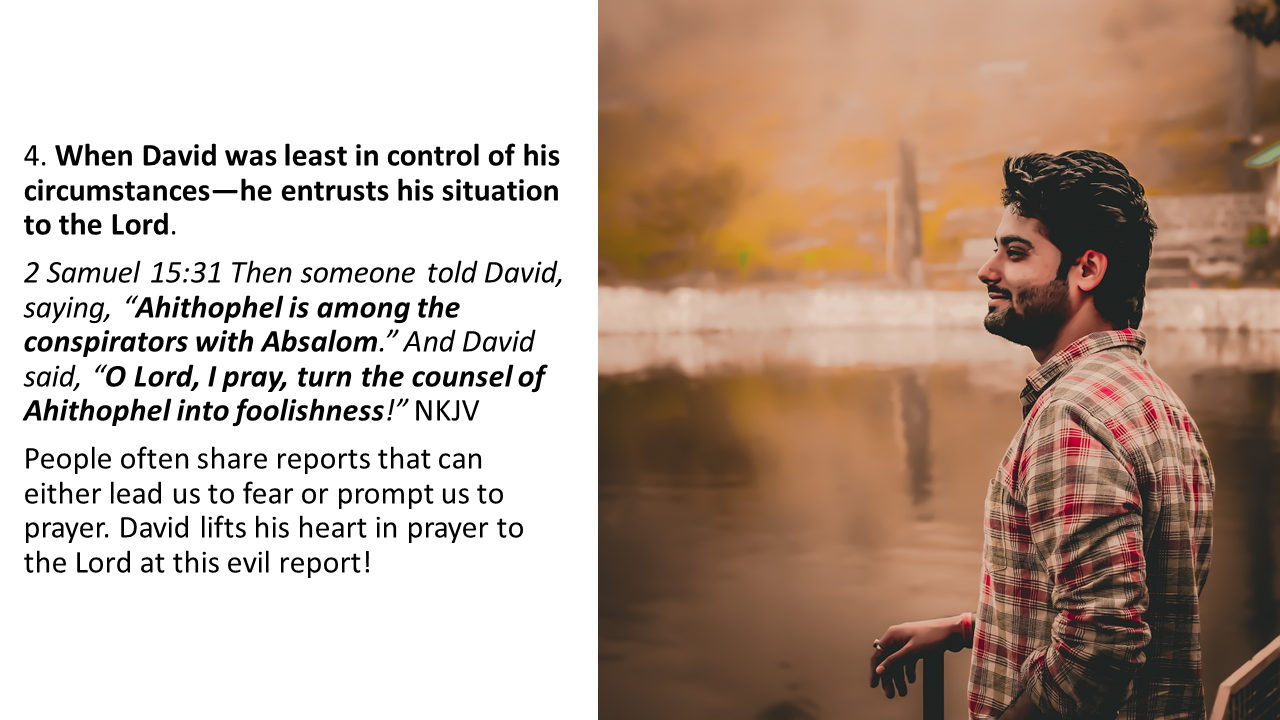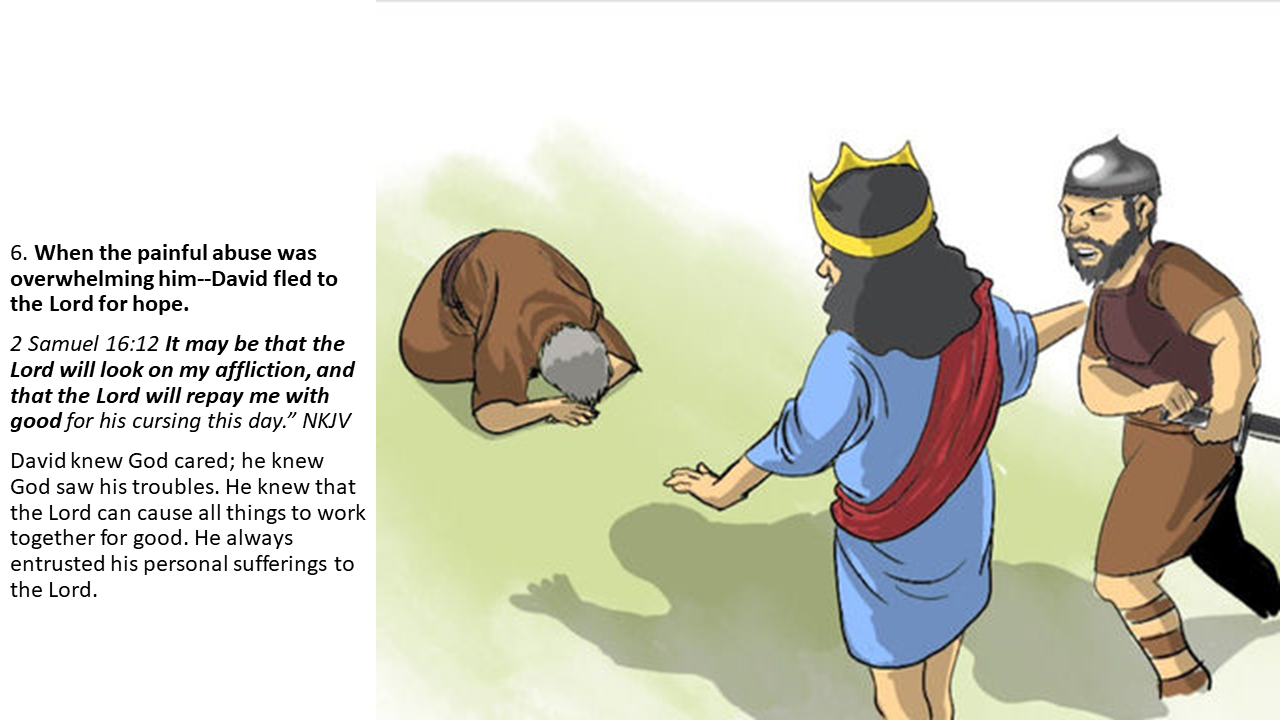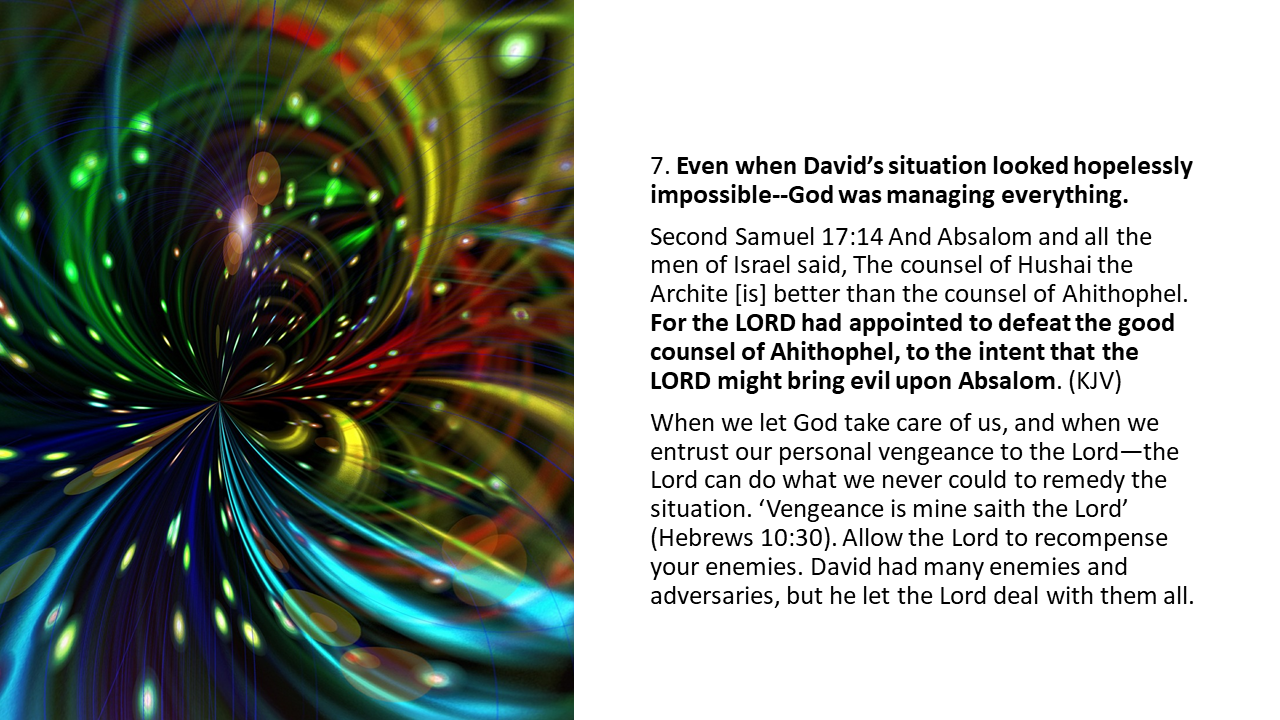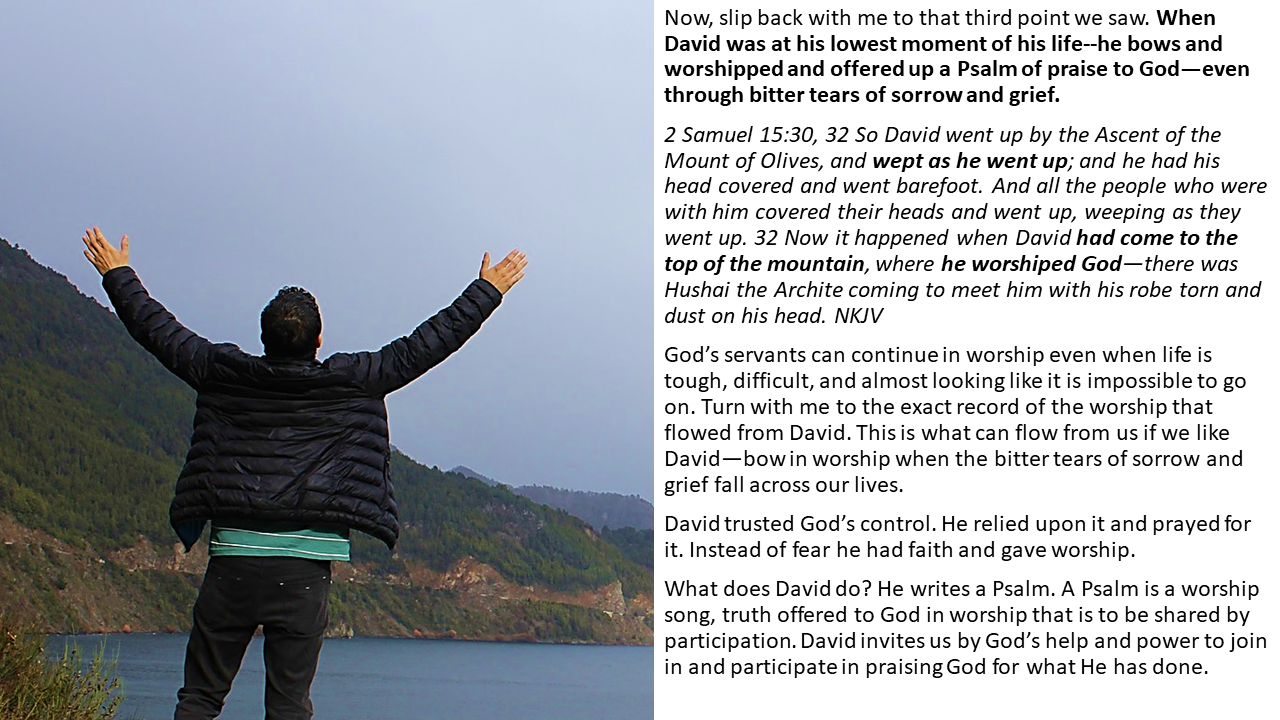If the YouTube video above is not available, here are two other ways to view:
How to Respond when Slandered
060827AM
DSS-35
2 Samuel 16:1-14
 One of the oldest and meanest tricks in the book is to hit someone when they’re down. Just sneak up on them when they are distracted by something else and hit them with a knockout blow.
One of the oldest and meanest tricks in the book is to hit someone when they’re down. Just sneak up on them when they are distracted by something else and hit them with a knockout blow.
That is one of Satan’s tactics.
EXPECT SATAN’S ATTACK WHEN YOU ARE DOWN
He used it on Joseph after his being sold into slavery by his brothers, before he could get over that–Potiphar’s wife lands him in prison. But by God’s grace, it didn’t work, and Joseph keeps following the Lord!
For Job is was one wave after another of bad news, each wave higher, deeper and more devastating—and then his wife turns on him. But by God’s grace, it didn’t work, and Job keeps following the Lord!
We can trace the same pattern in Abraham’s life, Elijah’s life, Daniel’s life, and many other Old Testament heroes.
In our lives it may be when we are in the midst of recovering from being sick and we lose our job. Or just when we finally find a job our wife can’t go on and wants to move back to her family. Or just after we weather the loss of a parent through death we get a report that one of our children is secretly leading an alternate lifestyle.
It is sudden, it is unexpected—and it is always at our weakest moments when it is the worst time possible.
As we open to 2 Samuel 15:14 we are watching David while he is down. It is the saddest day of his life. And that day while he is at the bottom, when he is really down and driven out of town—he gets an unexpected hit. He is attacked, slandered, and painfully abused from a totally unexpected person. In that moment—we see the real David.
What you and I are at our most desperate moments is a glimpse into what we really are. Where we decide to turn, when we face what we never wanted, never dreamed of happening to us—that is when what is really on the inside comes out.
The good news is that what comes out of David at that most painful moment of his life is a song.
And it was a song that was so good, God captured it and made it forever recorded in Heaven. That is better than the top of the charts, better that the top of the billboard, better than gold or platinum—because it pleased God. What ever you and I can do in this life that pleases God; that is what will last from our life eternally.
Watch David show us how to live even in pain, even through tears, even while slandered, and even when living through painful abuse.
David shows us how to live pleasing God. We can gain eternal rewards from every part of our life that is lived in a way that pleases God.
Barefoot, crying, and fleeing for his life. Could it get any worse? That must have been on David’s mind as the saddest day of his life unfolded.
To face the hatred of pagan Philistines was one thing—but the hatred of your own son is quite another. To have a murderous father-in-law is devastating, but to have a murderous child is beyond words.
So David was speechless as his tears ran and the wailing sobs of his friends rose about him.
WHEN OUR DREAMS TURN TO ASHES
That was how life became for a nearly 60 year old King David in the fall of 980 BC1. I think that a modern song writer once felt a bit of what David may have felt. Those feelings were captured by Bill Gaither 35 years ago. Listen to Gaither’s testimony in a song called–SOMETHING BEAUTIFUL2
 If there ever were dreams that were lofty and noble– They were my dreams at the start.
If there ever were dreams that were lofty and noble– They were my dreams at the start.
And the hopes for life’s best were the hopes that I harbored– Down deep in my heart.
But my dreams turned to ashes, My castles all crumbled, My fortune turned to loss.
So I wrapped it all in the rags of my life–And laid it at the cross
Something beautiful, something good; All my confusion, He understood.
All I had to offer Him Was brokenness and strife, But He made something beautiful of my life.
Just as we saw last time, this was the darkest day yet in David’s life. Remember how Satan often attacks us when we are at our weakest point? David was down—and life was about to get much worse.
So much happened to David all at once, and God catches each detail for His purposes of doctrine (teaching us what is right); for reproof (teaching us what is wrong); for correction (teaching us how to get right); and instruction in righteousness (teaching us how to stay right). That is why God has preserved these pages of Scriptures that lay open before us.
Just to help you understand this day, God’s Word gives us a step by step account. Follow along in your Bibles as we trace the events of that fateful day.
In 2 Samuel 15:14 David has left the City of David on Mount Zion (where it still sits today now excavated after centuries beneath the dust of time); he walks down Zion to the Kidron ravine, passes over a small brook of flowing water (15:23), follows the pathway up the mountain called Olives (15:30).
At the very top he pauses (15:32) and offers worship to the Lord. Then he runs into Ziba the servant of Mephibosheth (the crippled son of David’s friend Jonathan, son of Saul) who brings food to help David (16:1-4)
David has been joined by his faithful soldiers and mighty men. He has been sought out by the good and godly priests. He has been fed by the humble servants of others. So this next visitor was so unexpected. But so was everything else happening on this fateful day.
David is just reeling from it all. The whole insurrection or coup d’etat was so unexpected. The speed at which a loved and trusted son was able to draw the entire nation away from David was staggering. David’s thoughts raced back and forth from all the battles he had fought to save these people of Israel from their enemies. And now those very people’s children were the army that had joined his son to kill him.
WHEN MEMORIES TASTE BITTER
Then he thought of how he had rescued his own son Absalom so many times. Before he was old enough to even realize it David had kept young Absalom from Saul’s hand. Later David had risked his life to attack the raiding bands of the desert peoples and rescue Absalom from their grasp. Then David remembered bringing young and handsome Absalom up to Jerusalem, the City of David, Zion the City of God. How it had thrilled David’s heart to build a home and see his wives and children happy and secure in the home that God had provided. But nothing would ever be the same. Tamar was raped by Amnon. Absalom killed Amnon. Now Absalom was seeking to kill his own father David. Nothing was right; nothing would ever make this go away.
Back and forth flew his thoughts, his painful questions—why do the people turn away from me so quickly? Why does my own son hate me? Why does God allow all this?
And then as David looks around at his mighty men marching like a wall of strength around him, that space once occupied by the bravest of the brave, is empty. The same Uriah that went to his death at David’s deceitful bidding and murderous plot did so because he was loyal to the death for David—and always had been.
David’s thoughts raced back over the years and again smote him with contrition. Yes, again he knew that against the Lord all this had been done. And now David was suffering the consequences.
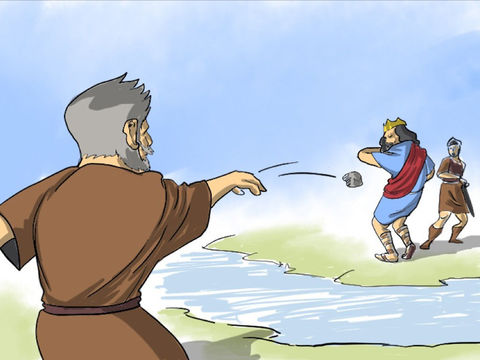 Somewhere in the midst of thoughts like these, mingled with tears, a barefoot David hears trouble coming. Before he saw him, he heard the hatred of his curses. Coming up from Bahurim, the first village on the downward slope of the Mt. of Olives is the figure of an angry man. Bitter to the point of blindness is this distant relative of Saul. With the poison of a venomous serpent on his tongue–curses, dust and rocks fly from the one man army named Shimei. With every means possible he tries to attack David while he is down.
Somewhere in the midst of thoughts like these, mingled with tears, a barefoot David hears trouble coming. Before he saw him, he heard the hatred of his curses. Coming up from Bahurim, the first village on the downward slope of the Mt. of Olives is the figure of an angry man. Bitter to the point of blindness is this distant relative of Saul. With the poison of a venomous serpent on his tongue–curses, dust and rocks fly from the one man army named Shimei. With every means possible he tries to attack David while he is down.
Isn’t that how temptations often come?
The devil in alliance with our flesh, the world around us, and the demons—tries to always get us at our weakest moment.
It was perfect timing—David was physically, emotionally, mentally, and humanly at his weakest and lowest point. But much to Satan’s disappointment I’m sure, David was not at his lowest point spiritually.
WHEN ATTACKED—DO THIS
David’s responses, in the verses of our text this morning are the most beautiful example of how to respond “When Attacked, Slandered and Painfully Abused”!
Please stand with me as we read 2 Samuel 16:1-14.
Pray.
Now let’s examine this passage capturing the saddest of all moments in David’s life as he fled from his son Absalom. We know that this was part of the inevitable consequences. But even as David faced those consequences—God was still watching to see what choices he would make. Either he would respond in a selfish and thus sinful way, or he would respond in a godly or glorifying way.
The good news is what we just read. David responds consistently for God—before Bathsheba and after Bathsheba. He was truly God’s man—that slipped into sin, repented and walked the walk from there on out.
We are in part two of a three part examination of the final era David’s life. The first era starts when David seems from the biblical chronology to be about 50 years old. And in that era, David’s unguarded moments lead to sin—Uriah and Bathsheba.
Part two is the sobering reminder that the–
Inevitable Consequences of David’s sin led to PAIN—Absalom and Shimei.
Chapters 15 and 16 where we stop today are two of the eleven chapters from 2nd Samuel 12-21, and 24 recording the many years of painful consequences because of David’s sin. This inspired record of that period that I call “David’s Inevitable Consequences that led to Pain” explains the Psalms that flow from David’s PAIN. These are Psalms are 3; 31; 55; 63.
Of course the good news from the God of New Beginnings is that the 3rd and final chapter of David’s life records David’s Humble Obedience leads to JOY— Solomon, and the Temple.
It is here we see that despite the failures of Bathsheba incident—David truly was after God’s own heart. We see him end well, using his final days for God’s glory. Four chapters capture these years in 2nd Samuel 22-23 and I Kings 1-2. The Psalms that flows from this final era I call “David’s Humble Obedience that leads to JOY” are Psalms 18; 71.
But here is the summary of what God has captured for us in this text. o Even when we face the consequences of our sin, o even when they are so painful—it is even then that we can praise our God, glorify our Savior, and experience even more than ever His grace that is always enough.
Now as we go step by step through this sad and painful day we can mine 8 wonderful truths to live by when we also suffer abuse, attacks, and slander.
Look how God was glorified in David’s painful consequences.
1. When David was at the bottom—God sent him help.
2 Samuel 15:19-21 Then the king said to Ittai the Gittite, “Why are you also going with us? Return and remain with the king. For you are a foreigner and also an exile from your own place. 20 In fact, you came only yesterday. Should I make you wander up and down with us today, since I go I know not where? Return, and take your brethren back. Mercy and truth be with you.” 21 But Ittai answered the king and said, “As the Lord lives, and as my lord the king lives, surely in whatever place my lord the king shall be, whether in death or life, even there also your servant will be.” NKJV
2. When David was at his weakest point–he waits for God’s provision.
2 Samuel 15:25 Then the king said to Zadok, “Carry the ark of God back into the city. If I find favor in the eyes of the Lord, He will bring me back and show me both it and His dwelling place. NKJV
Note that David does not try to defend himself. David left his burdens with the Lord so he didn’t have to take matters into his own hands. Notice that David does not grasp things, even when they are rightfully his. That is the strength and serenity we can have from the Lord. It is unusual and magnificent to see such strength—for it only comes from the Lord!
David knew that the Lord was with him, he didn’t need a box covered with gold to remind him. He had the Lord Himself, so he was willing to leave the Ark in the Tent and go out of the city trusting in God and God alone.
 3. When David was at his lowest moment of his life–he bows and offered up a Psalm of praise to God.
3. When David was at his lowest moment of his life–he bows and offered up a Psalm of praise to God.
2 Samuel 15:30, 32 So David went up by the Ascent of the Mount of Olives, and wept as he went up; and he had his head covered and went barefoot. And all the people who were with him covered their heads and went up, weeping as they went up. 32 Now it happened when David had come to the top of the mountain, where he worshiped God—there was Hushai the Archite coming to meet him with his robe torn and dust on his head. NKJV
God’s servants can continue in worship even when life is tough, difficult, and almost looking like it is impossible to go on. Turn with me to the exact record of the worship that flowed from David. This is what can flow from us if we like David—bow in worship when the bitter tears of sorrow and grief fall across our lives.
David trusted God’s control—even through bitter tears of sorrow and grief. He relied upon it and prayed for it. Instead of fear he had faith and gave worship.
4. When David was least in control of his circumstances—he entrusts his situation to the Lord.
2 Samuel 15:31 Then someone told David, saying, “Ahithophel is among the conspirators with Absalom.” And David said, “O Lord, I pray, turn the counsel of Ahithophel into foolishness!” NKJV
People often share reports that can either lead us to fear or prompt us to prayer. David lifts his heart in prayer to the Lord at this evil report!
5. When David was attacked—he realized that God allows adversaries for His own purposes.
2 Samuel 16:9-11 Then Abishai the son of Zeruiah said to the king, “Why should this dead dog curse my lord the king? Please, let me go over and take off his head!” 10 But the king said, “What have I to do with you, you sons of Zeruiah? So let him curse, because the Lord has said to him, ‘Curse David.’ Who then shall say, ‘Why have you done so?’ ” 11 And David said to Abishai and all his servants, “See how my son who came from my own body seeks my life. How much more now may this Benjamite? Let him alone, and let him curse; for so the Lord has ordered him. NKJV
He entrusts his personal adversaries to the Lord. David knew that God raises up and puts down. He knew adversaries were allowed by God—and he wanted to respond correctly! God often allows us to be attacked by various adversaries, just to reveal what is really in our hearts.
6. When the painful abuse was overwhelming him–David fled to the Lord for hope.
2 Samuel 16:12 It may be that the Lord will look on my affliction, and that the Lord will repay me with good for his cursing this day.” NKJV
David knew God cared; he knew God saw his troubles. He knew that the Lord can cause all things to work together for good. He always entrusted his personal sufferings to the Lord.
7. Even when David’s situation looked hopelessly impossible–God was managing everything.
Second Samuel 17:14 And Absalom and all the men of Israel said, The counsel of Hushai the Archite [is] better than the counsel of Ahithophel. For the LORD had appointed to defeat the good counsel of Ahithophel, to the intent that the LORD might bring evil upon Absalom. (KJV)
When we let God take care of us, and when we entrust our personal vengeance to the Lord—the Lord can do what we never could to remedy the situation. ‘Vengeance is mine saith the Lord’ (Hebrews 10:30). Allow the Lord to recompense your enemies. David had many enemies and adversaries, but he let the Lord deal with them all.
8. At just the exact moment God planned–David’s needs are met.
2 Samuel 17:27-29 Now it happened, when David had come to Mahanaim, that Shobi the son of Nahash from Rabbah of the people of Ammon, Machir the son of Ammiel from Lo Debar, and Barzillai the Gileadite from Rogelim, 28 brought beds and basins, earthen vessels and wheat, barley and flour, parched grain and beans, lentils and parched seeds, 29 honey and curds, sheep and cheese of the herd, for David and the people who were with him to eat. For they said, “The people are hungry and weary and thirsty in the wilderness.” NKJV
God works behind the scenes in the hearts of people to provide just what David needed to continue on. So a servant of the Lord must always entrust his personal needs to the Lord.
 Now, slip back with me to that third point we saw. When David was at his lowest moment of his life–he bows and worshipped and offered up a Psalm of praise to God—even through bitter tears of sorrow and grief.
Now, slip back with me to that third point we saw. When David was at his lowest moment of his life–he bows and worshipped and offered up a Psalm of praise to God—even through bitter tears of sorrow and grief.
2 Samuel 15:30, 32 So David went up by the Ascent of the Mount of Olives, and wept as he went up; and he had his head covered and went barefoot. And all the people who were with him covered their heads and went up, weeping as they went up. 32 Now it happened when David had come to the top of the mountain, where he worshiped God—there was Hushai the Archite coming to meet him with his robe torn and dust on his head. NKJV
God’s servants can continue in worship even when life is tough, difficult, and almost looking like it is impossible to go on. Turn with me to the exact record of the worship that flowed from David. This is what can flow from us if we like David—bow in worship when the bitter tears of sorrow and grief fall across our lives.
David trusted God’s control. He relied upon it and prayed for it. Instead of fear he had faith and gave worship.
What does David do? He writes a Psalm. A Psalm is a worship song, truth offered to God in worship that is to be shared by participation. David invites us by God’s help and power to join in and participate in praising God for what He has done.
The 3rd Psalm is an amazing Psalm: it is the first Psalm in the Bible called a Psalm; it is the first Psalm noted as written by David; and it is the first Psalm that gives us a Divinely written setting in the first verse of the Hebrew text.
Psalm 3:1-8 (NIV) A psalm of David. When he fled from his son Absalom.
LORD, how many are my foes! How many rise up against me! 2 Many are saying of me, “God will not deliver him.” Selah
3 But you are a shield around me, O LORD; you bestow glory on me and lift up my head. 4 To the LORD I cry aloud, and he answers me from his holy hill. Selah
5 I lie down and sleep; I wake again, because the LORD sustains me. 6 I will not fear the tens of thousands drawn up against me on every side. 7 Arise, O LORD! Deliver me, O my God! Strike all my enemies on the jaw; break the teeth of the wicked. 8 From the LORD comes deliverance. May your blessing be on your people. Selah
Psalm 3:1-8 (NAS) A Psalm of David, when he fled from Absalom his son.
Lord, how my adversaries have increased! Many are rising up against me. 2 Many are saying of my soul, “There is no deliverance for him in God.” [Selah].
3 But Thou, O Lord, art a shield about me, My glory, and the One who lifts my head. 4 I was crying to the Lord with my voice, And He answered me from His holy mountain.[Selah].
5 I lay down and slept; I awoke, for the Lord sustains me. 6 I will not be afraid of ten thousands of people Who have set themselves against me round about. 7 Arise, O Lord; save me, O my God! For Thou hast smitten all my enemies on the cheek; Thou hast shattered the teeth of the wicked. 8 Salvation belongs to the Lord; Thy blessing be upon Thy people! [Selah].
Psalm 3:1-8 A Psalm of David, when he fled from Absalom his son. NKJV
1 Lord, how they have increased who trouble me! Many are they who rise up against me.
2 Many are they who say of me, “There is no help for him in God.” SELAH
3 But You, O Lord, are a shield for me, My glory and the One who lifts up my head.
4 I cried to the Lord with my voice, And He heard me from His holy hill. SELAH
5 I lay down and slept; I awoke, for the Lord sustained me.
6 I will not be afraid of ten thousands of people Who have set themselves against me all around.
7 Arise, O Lord; Save me, O my God! For You have struck all my enemies on the cheekbone; You have broken the teeth of the ungodly.
8 Salvation belongs to the Lord. Your blessing is upon Your people. SELAH
This Psalm is set in the context of battles. If you trace through the verses you find about seven different indications of warfare and battlefields are the setting:
1. David was facing “foes” NIV; “adversaries” NAS (v. 1);
2. David needed a “shield” (v. 3);
3. David saw them deployed like an army v.6 “set against me” (NAS/NKJV) “drawn up against me” (NIV);
4. David calls them “enemies (v. 7);
5. David cries “arise O Lord” v.7 and uses the actual formula for entering battle from Numbers 10:35;
6. David speaks of armies (“people” in v. 8 can also be used for an army);
7. David sought victory implied by the word “deliverance” (v. 8 NIV), and deliverance from the Lord is a war cry.
This Psalm divides up the message God is giving through David by the use of the word SELAH. Selah means ‘lift up’ and is a musical term for crescendo. It means boom it out, crank it up—punctuate that with emphasis. Then stop and ask yourself what do you think of that?
So at the end of verse two, ‘many say there is no help for him in God.’ Selah—boom! Stop and consider this. What do you think of that? And David pauses and thinks about that and finds a lifetime of definite proof that God did care for him.
So at the end of verse four he says, ‘He answered me…’. Selah—boom! Stop and consider this. What do you think of that? And David reflects upon his steadfast hope, and confident faith that God has rescued him in the past and will continue to do so.
So at the end of verse eight he says, ‘Salvation is of the Lord’. Selah—boom! Stop and consider this. What do you think of that? And David reflects upon the truth that it is God who alone can save us from all and any of our deepest troubles.
1 David’s scouts hid in a well where grain was spread to cover their hideout means fall; David reigned from 1010-970 BC and this tragic scene with Absalom was approximately 9-10 years before his death in 970 BC.
2 © 1971 by William J. Gaither. All rights reserved.
Slides
Check Out All The Sermons In The Series
You can find all the sermons and short clips from this series, David’s Spiritual Secret here.
Looking To Study The Bible Like Dr. Barnett?
Dr. Barnett has curated an Amazon page with a large collection of resources he uses in his study of God’s Word. You can check it out here.




